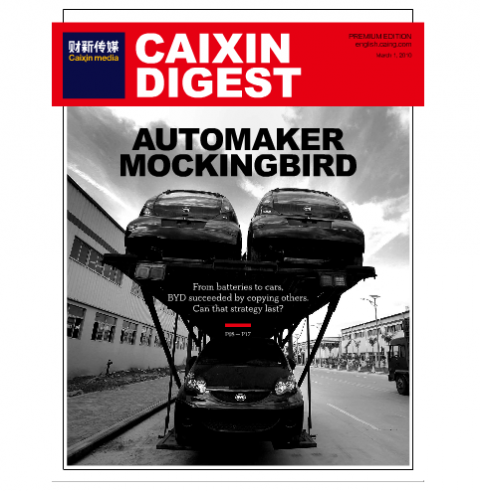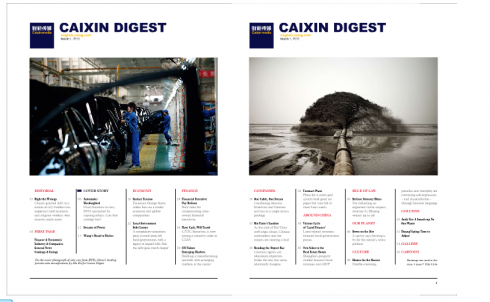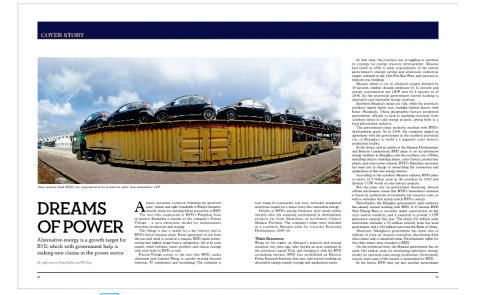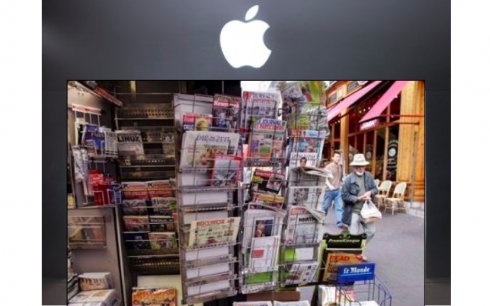TAKEAWAY: This week finds me in Hong Kong, and one can’t help but to be fascinated by how everything China is so palpable here, including Caixin Media, the vibrant Beijing-based media group which aims to help traditional media take the quick ride to prosperity in the 24/7 information age. PLUS: An Apple press kiosk coming to a corner near you?
China and media landscape



Pages from Caixin Media magazine: in English, projecting China to the world
With a typhoon sending us rain from Taiwan, it is a wet Monday in Hong Kong. Add fog over Victoria Harbour and what seems like a well choreographed musical number involving thousands of umbrella carrying high school students, in uniform, as they cross every intersection of always busy Hong Kong. Yes, I left the office of the South China Morning Post at exactly 5:15 pm local time and found myself swimming upstream against the crowd to meet the driver.
In a sea of teenagers, my thoughts drifted from the typhoon to how many of these youngsters would be reading a printed newspaper in the next five years. Hong Kong has one of the youngest populations in the world, with a high consumption of mobile telephones——and, I should add, iPods, which I saw connected to the ears of these students.
But the bigger story is China and what is happening there. Last night at dinner, South China Morning Post editor Reg Chua was telling me about the thousands of newspapers in mainland China, “most of which look pretty horrible.” But, Reg added, they are well read; the Chinese read their newspapers with gusto. He also mentioned that Chinese publishers and editors are becoming more aware of how western newspapers look, and are beginning to take steps to make them look better.
Meanwhile, the emphasis is on the publications that are published in English to “export” Chinese business/development to the rest of the world.
One such company is Caixin Media Company Ltd. a Beijing-based media group dedicated to providing financial and business news and information through periodicals, online, conferences, books, and TV / video programs. Reg likes what Caixin does and sees it as an example of things to come in Chinese media. He is particularly keen on Ms. Hu Shuli, the former founding editor of Caijing Magazine, who is one of the founders and editor-in-chief of Caixin Media. She also serves as the Dean of the School of Communication and Design at Sun Yat-Sen University. Caixin Media has more than 100 editorial staff and 80 staff members on the business side.
Reg thinks that I should meet Ms. Hu Shuli, and I am looking forward to that encounter.
For those interested in taking a peek at Caixin Magazine, can go here:
http://english.caing.com/caixin_digest/
For their Chinese website:
their Chinese website: http://www.caing.com/
I have taken a look and see that the English version of the magazine uses a clean, classic design which gives it a sense of authority, a radical departure of what one sees in most Chinese language publications.
More to come, and if I have a chance to interview Ms. Hu Shuli while I am here this week, it will be posted.

The Apple Press Kiosk?

Here is a story that continues to fascinate publishers and those interested in all things iPad: Apple courts publishers to join its press kiosk, so to speak. How many will follow Apple?
In my view, the reactions are split; some publishers still want to go it alone rather than pay Apple what is reportedly to be 30% of the take.
The publishers I talk to seem to be more interested in the fact that Apple has already allowed some publishers—including The Wall Street Journal, the Financial Times and digital magazine newsstand Zinio—to forego its usual revenue-sharing and data-collection terms by allowing them to sign up subscribers for iPad editions directly.
I do see some publishers enthusiastic about tying their revenue producing part of the iPad business to Apple, stating that it is good for their newspapers and magazines to be part of the rest of what Apple sells through its store: music, videos, books.
One must first see what deals Apple cuts with publishers. I see one advantage in joining Apple: the Apple store generates traffic with the profile of people we would like to attract to our titles—-youngish, smart, disposable income, etc. They may stop by to get a video or download a song, but, suddenly, these newspapers and magazines are also there. Why not?
We will continue to monitor the story here.
For more details:
http://online.wsj.com/article/SB10001424052748704416904575501912896373130.html